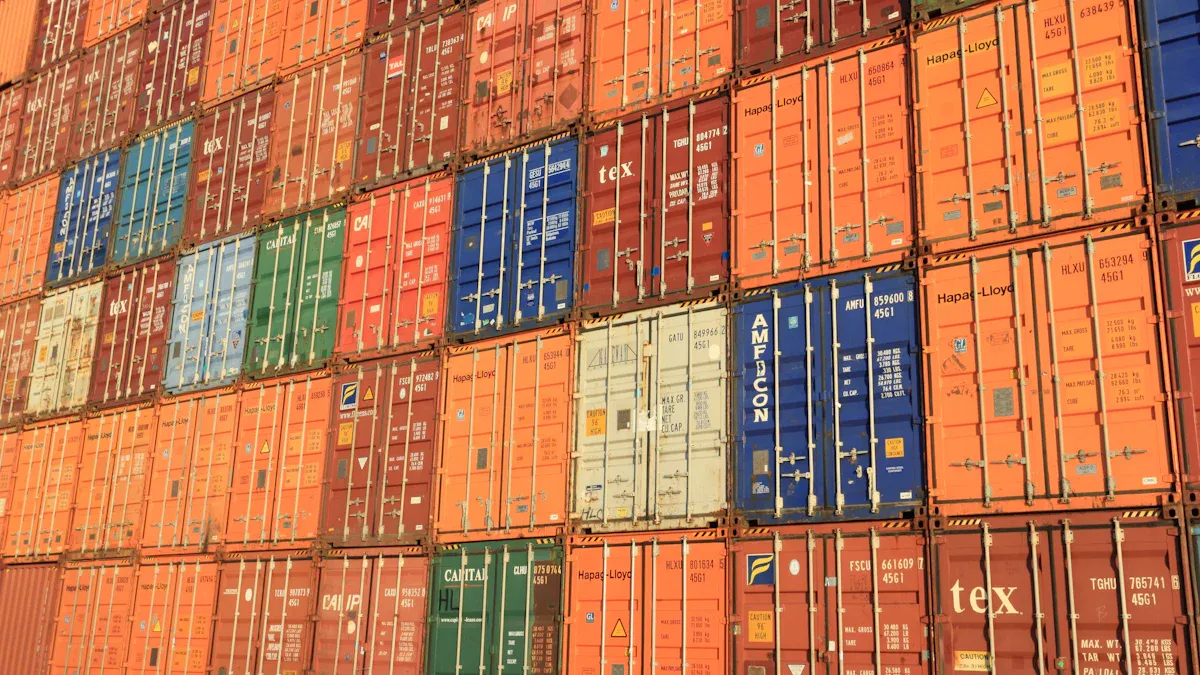SHEIN and Temu: Battling Tariff Changes and Seeking New Horizons

Recent tariff changes have disrupted the operations of Chinese e-commerce giants SHEIN and Temu, forcing them to rethink their strategies. The termination of the de minimis exemption has led to higher costs for items like $5 blouses and $14 sneakers, making affordability a challenge for millions. Over 1 billion duty-free packages entered the U.S. in 2023, with nearly half sent to low-income areas. These shifts disproportionately affect lower-income households, who spend a larger share of their income on apparel.
To counter these challenges, SHEIN and Temu have adopted innovative approaches. Temu now sources 30% of its U.S.-bound goods domestically, mitigating tariff impacts but raising prices by 20-40%. SHEIN, leveraging its stronger profit margins, absorbs some costs to maintain competitive pricing. Both companies have also expanded globally, targeting emerging markets and diversifying their supply chains to sustain growth.
Key Takeaways
New tariffs have raised costs for SHEIN and Temu. This makes products less affordable for shoppers. Companies need new pricing plans to stay competitive.
SHEIN and Temu are finding new ways to get products. They are buying locally and looking at other markets. This helps them depend less on U.S. imports.
Technology is very important for working faster and smarter. Both companies use data and AI to manage stock better. This also helps make customers happier.
Teaming up with others, like Temu working with DHL, helps shipping run smoothly. It also improves service, which is key for global business.
Being eco-friendly is now a big deal in online shopping. Companies should use green practices to earn trust and keep customers loyal.
The Impact of Tariff Changes on SHEIN and Temu

Overview of Recent Tariff Changes
Recent modifications to U.S. tariff policies have reshaped the landscape for cross-border e-commerce platforms like SHEIN and Temu. The termination of the de minimis exemption has introduced significant challenges, requiring these companies to adapt quickly. Temu now highlights products sourced from local warehouses to bypass import charges, while implementing fees on other items to offset customs-related expenses. SHEIN has streamlined its checkout process by including all tariff and import fees upfront, ensuring transparency for customers. These changes reflect a shift in operational strategies as both companies navigate the complexities of international trade regulations.
Challenges in Customs Clearance and Logistics
The abrupt policy changes have created logistical bottlenecks for e-commerce retailers. Over a million packages accumulated at JFK Airport due to unprepared customs systems, signaling a major backlog. The need to assess and levy tariffs on millions of small parcels has slowed delivery networks, causing extended wait times at port warehouses. SHEIN and Temu face increased operational costs as they transition away from the "free shipping, no tax" model. Temu has responded by strengthening compliance management and preparing for policy shifts, aiming to mitigate delays and maintain customer satisfaction.
Note: The logistical challenges underscore the importance of efficient customs clearance solutions, which are vital for sustaining the growth of cross-border e-commerce platforms.
Financial and Operational Impacts on SHEIN and Temu
The financial repercussions of these tariff changes are profound. SHEIN and Temu have had to adjust their pricing models, with Temu raising prices by 20-40% on U.S.-bound goods sourced locally. SHEIN absorbs some costs to maintain competitive pricing, leveraging its stronger profit margins. Operationally, both companies have shifted their focus to diversifying supply chains and exploring new markets. Temu’s semi-managed model, which allows sellers to stock goods in overseas warehouses, reduces dependency on direct imports. These adaptations highlight their resilience in the face of rising costs and logistical hurdles.
Strategies for Adapting to Tariff Changes
Supply Chain Adjustments and the Role of JUSDA
SHEIN and Temu have implemented significant supply chain adjustments to mitigate the impact of tariff changes. These adjustments include diversifying production locations and leveraging advanced logistics solutions. SHEIN has encouraged suppliers to establish factories in Vietnam, offering profit subsidies to facilitate this transition. This move reduces dependency on Chinese manufacturing and minimizes exposure to U.S. tariffs. Similarly, Temu has adopted a semi-managed model, enabling sellers to stock goods in overseas warehouses. This approach bypasses customs delays and ensures faster delivery to customers.
JUSDA plays a pivotal role in supporting these supply chain transformations. Its JusTrade platform streamlines customs clearance processes, reducing delays and ensuring compliance with international trade regulations. By integrating AI algorithms and big data analysis, JusTrade enhances efficiency and transparency across the supply chain. For instance, its bonded zone expressway and cross-border logistics solutions enable seamless movement of goods, helping companies like SHEIN and Temu maintain operational continuity. JUSDA's expertise in supply chain management empowers these e-commerce giants to navigate complex customs procedures and adapt to evolving trade policies effectively.
Pricing Models and Product Diversification
To counter rising costs, SHEIN and Temu have restructured their pricing models and diversified their product offerings. Temu has introduced dynamic pricing strategies, adjusting prices in real-time based on over 100 variables. This approach allows the platform to remain competitive while maintaining profit margins. SHEIN, on the other hand, absorbs a portion of the tariff costs to keep prices affordable for its customer base. This strategy leverages its robust profit margins and ensures customer loyalty despite increased operational expenses.
Product diversification has also emerged as a key strategy. SHEIN and Temu have expanded their product categories to include higher-margin items, such as home goods and electronics. This diversification offsets the financial impact of tariffs on low-cost apparel. Additionally, both companies have targeted emerging markets like Brazil and Australia, where tariff policies are less restrictive. By tailoring their product offerings to local preferences, they have successfully tapped into new revenue streams and reduced reliance on the U.S. market.
Leveraging Technology for Efficiency
Technology serves as a cornerstone for SHEIN and Temu's adaptive strategies. SHEIN utilizes big data optimization to analyze consumer preferences, enabling the rapid introduction of new styles. Its AI-driven design support system accelerates the production of design samples, ensuring a faster product cycle than competitors. These technological innovations allow SHEIN to maintain its position as a leader in fast fashion.
Temu employs advanced predictive analytics to optimize inventory management and pricing. This technology enables real-time adjustments, resulting in a 30-40% higher inventory turnover rate. Additionally, Temu's logistics network incorporates robotics and AI for package sorting and routing, reducing handling time by up to 50%. These efficiencies not only lower operational costs but also enhance customer satisfaction through faster delivery times.
The role of technology extends beyond operational improvements. It also supports strategic decision-making. For example, SHEIN and Temu have reduced their U.S. advertising spend by 19% and 31%, respectively, between March 31 and April 13, 2025. This reallocation of resources reflects their data-driven approach to market expansion and cost management. By leveraging technology, both companies have demonstrated resilience and adaptability in the face of tariff challenges.
Exploring New Horizons for Growth

Expansion into Emerging Markets
Emerging markets present a significant opportunity for e-commerce platforms to expand their operations and diversify revenue streams. These regions, characterized by rapid economic growth and increasing internet penetration, offer fertile ground for companies like SHEIN and Temu to establish a strong foothold.
The global e-commerce market is projected to grow from USD 18.171 trillion in 2024 to USD 79.972 trillion by 2035, reflecting a robust compound annual growth rate (CAGR) of 14.42%.
Asia-Pacific is expected to lead this growth, driven by a young, mobile-first population and expanding internet access.
Government initiatives, such as Digital India and Cash-Free Shopping, are fostering online shopping habits across diverse demographics.
SHEIN and Temu have already begun capitalizing on these opportunities. SHEIN has increased its presence in Brazil, aiming to onboard thousands of local sellers and expand operations into new states. Similarly, Temu has intensified its advertising efforts in Brazil and Europe, with a notable 800-fold increase in ad spending in Brazil during April 2023. These strategic moves highlight their commitment to reducing reliance on the U.S. market while tapping into the immense potential of emerging economies.
Tip: Companies entering emerging markets should tailor their strategies to local consumer preferences and regulatory environments to maximize success.
Strategic Partnerships and Collaborations
Strategic partnerships have proven to be a powerful tool for businesses seeking to enhance their global operations. By collaborating with complementary organizations, companies can leverage shared resources, expertise, and market access to achieve mutual growth.
Several high-profile partnerships illustrate the potential of such collaborations:
Nike and Apple combined athletic expertise with technology to create the Nike+iPod Sports Kit, tapping into the fitness tech market.
Amazon and Whole Foods merged e-commerce with physical retail, revolutionizing grocery delivery services.
Microsoft and Adobe integrated creative tools with cloud services, enhancing user capabilities.
SHEIN and Temu are following a similar path. Temu recently partnered with DHL to support localized operations in Europe, ensuring faster and more reliable deliveries. These collaborations not only streamline logistics but also enhance customer satisfaction by improving service quality. For e-commerce platforms, strategic alliances are a vital component of their growth strategy, enabling them to navigate complex international markets effectively.
Sustainability and Ethical Practices in E-Commerce
Sustainability has become a critical differentiator in the e-commerce industry. Consumers are increasingly aware of the environmental impact of their purchases and demand that businesses adopt eco-friendly practices. Companies that prioritize sustainability not only enhance their brand image but also build trust and loyalty among conscious consumers.
Key practices that resonate with today's climate-conscious shoppers include:
Sourcing materials sustainably while ensuring fair labor practices.
Communicating sustainability efforts transparently to consumers.
SHEIN and Temu have recognized the importance of integrating ethical practices into their operations. Both companies are exploring ways to reduce their carbon footprint, such as optimizing supply chains and adopting greener logistics solutions. By aligning their business models with the values of environmentally conscious consumers, they are positioning themselves as leaders in sustainable e-commerce.
Note: Transparency in sustainability efforts is essential for building long-term consumer trust and loyalty.
The Role of JusTrade in Supporting Cross-Border E-Commerce
Streamlining Customs Clearance for SHEIN and Temu
JusTrade simplifies customs clearance for SHEIN and Temu by offering intelligent solutions tailored to cross-border e-commerce. Its proprietary SAAS platform integrates AI algorithms and big data analysis to automate customs processes. This reduces manual errors and accelerates clearance times. For example, JusTrade’s bonded zone expressway ensures faster movement of goods through customs, minimizing delays that often disrupt delivery schedules.
SHEIN and Temu benefit from JusTrade’s expertise in handling complex customs regulations. The platform categorizes commodities efficiently, ensuring accurate declarations and compliance with international trade laws. By leveraging JusTrade’s services, these e-commerce giants avoid penalties and maintain uninterrupted operations. This streamlined approach enhances their ability to meet customer expectations despite tariff challenges.
Tip: Efficient customs clearance is critical for maintaining customer satisfaction and reducing operational costs in cross-border trade.
Enhancing Supply Chain Visibility with JusTrade
JusTrade enhances supply chain visibility by integrating real-time tracking and data analytics into its platform. This allows SHEIN and Temu to monitor shipments at every stage, from origin to destination. The platform’s IoT-enabled features provide detailed insights into customs clearance progress, inventory levels, and transportation timelines.
For SHEIN, this visibility ensures timely delivery of fast-fashion products, aligning with its rapid production cycles. Temu uses JusTrade’s tracking capabilities to optimize its semi-managed model, ensuring goods stocked in overseas warehouses reach customers without delays. The transparency offered by JusTrade reduces risks and improves decision-making for both companies.
Feature | Benefit |
|---|---|
Real-time tracking | Faster issue resolution |
Inventory visibility | Improved stock management |
Data analytics | Enhanced operational efficiency |
Leveraging JusTrade’s SAAS Platform for Compliance
JusTrade’s SAAS platform ensures compliance with evolving trade regulations. It connects procurement, logistics, customs declaration, and finance departments, creating a seamless workflow. This integration reduces the risk of non-compliance and ensures accurate documentation for customs authorities.

JUSDA Solutions
To provide you with professional solutions and quotations.
Temu relies on JusTrade to navigate the complexities of U.S. tariff policies. The platform’s intelligent customs clearance system adapts to policy changes, ensuring smooth operations. SHEIN benefits from JusTrade’s ability to handle high volumes of declarations, maintaining its competitive edge in global markets.
Note: JusTrade’s compliance solutions empower businesses to focus on growth while minimizing regulatory risks.
SHEIN and Temu have demonstrated remarkable adaptability in navigating tariff challenges. Their strategies include reducing advertising budgets, halting Google Shopping ads in the U.S., and adjusting pricing models to offset rising costs. These measures highlight their resilience in maintaining market competitiveness.
Innovation, strategic partnerships, and market diversification remain critical for future growth. By leveraging technology and exploring emerging markets, both companies position themselves to thrive in a dynamic global e-commerce landscape. Their ability to adapt ensures sustained success despite evolving trade policies and economic pressures.
Tip: Businesses should continuously innovate and diversify to remain competitive in a rapidly changing market.
FAQ
What is the de minimis exemption, and how did its termination affect SHEIN and Temu?
The de minimis exemption allowed duty-free imports for goods valued under $800. Its termination increased tariffs, raising costs for SHEIN and Temu. This policy shift forced both companies to adjust pricing, diversify supply chains, and explore alternative logistics models to maintain competitiveness.
How does JusTrade streamline customs clearance for cross-border e-commerce?
JusTrade uses an AI-powered SAAS platform to automate customs processes. It categorizes commodities, ensures compliance, and accelerates clearance times. Features like real-time tracking and bonded zone expressways help SHEIN and Temu avoid delays, reduce costs, and maintain operational efficiency.
Why are SHEIN and Temu focusing on emerging markets?
Emerging markets offer high growth potential due to increasing internet penetration and economic development. By expanding into regions like Brazil and Southeast Asia, SHEIN and Temu reduce reliance on the U.S. market and tap into new revenue streams, ensuring long-term sustainability.
What role does technology play in SHEIN and Temu’s strategies?
Technology drives efficiency and innovation for both companies. SHEIN uses AI for design optimization, while Temu employs predictive analytics for inventory management. These tools enhance decision-making, reduce costs, and improve customer satisfaction, enabling them to adapt to evolving market conditions.
How does JUSDA support SHEIN and Temu in overcoming tariff challenges?
JUSDA provides tailored supply chain solutions through its JusTrade platform. It simplifies customs clearance, enhances supply chain visibility, and ensures compliance with trade regulations. These services empower SHEIN and Temu to navigate complex international markets and sustain growth despite tariff changes.
See Also
Embracing Transformation: Adapting to Technology in Supply Chains
Revealing Innovative Strategies for Cross-Border Supplier Partnerships
Are You Spending Too Much? Tips to Cut Supply Chain Costs
Jusda: Your Guide to Achieving Supply Chain Resilience
Exploring Sea Freight Logistics: Innovations for 2024 Revealed
